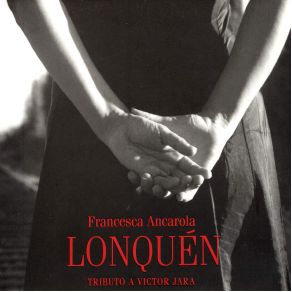Lonquén - Tributo a Victor Jara / Lonquen - Tributo a Victor Jara
Download links and information about Lonquén - Tributo a Victor Jara / Lonquen - Tributo a Victor Jara by Francesca Ancarola. This album was released in 2006 and it belongs to Latin genres. It contains 13 tracks with total duration of 01:04:53 minutes.

|
|
|---|---|
| Artist: | Francesca Ancarola |
| Release date: | 2006 |
| Genre: | Latin |
| Tracks: | 13 |
| Duration: | 01:04:53 |
| Buy it NOW at: | |
| Buy on iTunes $9.99 | |
Tracks
[Edit]| No. | Title | Length |
|---|---|---|
| 1. | Lonquén | 2:11 |
| 2. | Canto Libre | 6:23 |
| 3. | Lo Único Que Tengo | 3:59 |
| 4. | El Lazo | 6:09 |
| 5. | Angelita Huenumán | 5:30 |
| 6. | Que Saco Con Rogar Al Cielo | 8:09 |
| 7. | El Derecho de Vivir en Paz | 4:45 |
| 8. | Luchín | 3:56 |
| 9. | El Cigarrito | 3:43 |
| 10. | Poema 15 | 5:59 |
| 11. | El Amor Es un Camino... | 3:44 |
| 12. | Te Recuerdo Amanda | 3:58 |
| 13. | Manifiesto | 6:27 |
Details
[Edit]In order to understand the potency of Francesca Ancarola's album-length tribute to the late Chilean folksinger Victor Jara, one must first understand who Jara was. Born in 1932, by the late '60s Jara had become one of the most popular artists in Chile, an anti-authoritarian protest singer and one of the founders of the country's politically charged "new song" movement. That militancy didn't sit well with the leaders of the coup who ousted General Augusto Pinochet from power in September 1973, and Jara was taken, along with thousands of others who disagreed with the right-wing brutes, to a stadium, where his hands and ribs were broken. Within a few days, as he sang defiantly to the crowd, Jara was murdered in a burst of machine gun fire at age 40. Many of his recording masters were subsequently destroyed, but that stadium now bears his name, testifying to his importance within Chilean culture. Ancarola was only five years old when Jara was killed, but like so many Chileans, she considers him an iconic figure in her life, hence this album. While Ancarola's arrangements are often quite different from Jara's own folksy style, she possesses a warm, rich voice that conveys the emotion that oozed from Jara's own work, and she breathes new life into the music not by copying the original ideas but by recasting it. Lonquén begins with the a cappella title track, the only original composition on the record, before diverging into an often jazzy, sometimes pop-ish direction, albeit one that never leaves the traditional Chilean elements too far behind. Ancarola prefers simple backing, heavy on the standup bass and acoustic guitar, but she makes great use of that minimal accompaniment, using it to accent her florid outpourings. Some familiar with the work of Jara — what little that survived has been reissued by his widow — might contend that Ancarola's vocal delivery is actually too sweet to put across the urgency of Jara's lyrics. Not true: although Jara's words were fiery, there was always an undercurrent of love, hope, and peace there, and Ancarola's creative interpretations make it clear that his work still has meaning today — maybe even more than it did in his own time.